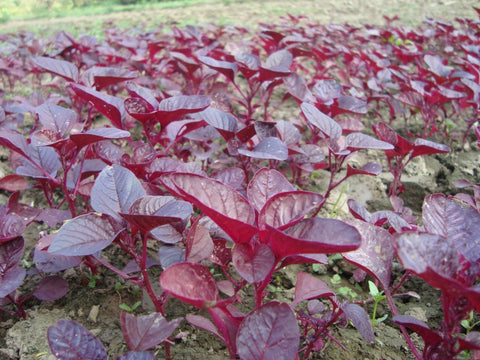How Can I Boost My Energy After 50?
A lesson on how age affects your nitric oxide levels and what you can do
“A twenty-three-year-long study in Ohio determined that people who saw growing older as something positive lived a whopping seven and a half years longer than those who didn’t.” - Victoria Moran, Younger by the Day: 365 Ways to Rejuvenate Your Body and Revitalize Your Spirit
Aging is a natural process. Maintaining optimal health helps turn that process into a more enjoyable and fulfilling adventure. Life events tend to pass by like landscapes and streets on a road trip. And just as we begin recalling those past events, we may start to notice big changes to the route we're on, the passage of time, and the questioning of vitality and how to maintain or even recover it. We may not realize that bodily processes that we used to take for granted have now slowed. One major shift that dramatically impacts our energy levels is the reduction in naturally produced nitric oxide (NO).
Nitric oxide is a gas, so we can't see it, we can't inhale it -- it must be produced in the body. As we age, we lose roughly 10% of our natural ability to produce nitric oxide with every decade that passes (see graph below). From age 30 onward we begin to experience significant drops in nitric oxide production. As such, without supplementation we start to notice correlating shifts in functions that nitric oxide affects like:
From age 30 onward we begin to experience significant drops in nitric oxide production. As such, without supplementation we start to notice correlating shifts in functions that nitric oxide affects like:
- Vision
- Energy Levels
- Stress Levels
- Physical Agility
- Mental Agility
- Stamina
- Overall health
Age-defying energy
One of the most common and noticeable symptoms of aging is a decline in energy. However, your energy level is not something to quickly dismiss or accept as a sign of aging. Here’s why! One of the most overlooked generators of a healthy lifestyle, including how pumped you feel throughout your day, is the presence or lack of nitric oxide. Numerous studies reveal that constitutive production of nitric oxide is reduced every year and this circumstance has proven relevant to a number of age-related health issues that plague older adults, including the tell-tale sign -- energy levels.
Growing older doesn’t automatically mean less vibrancy and vigor, or lower energy levels. To prove that, we’ve laid out some helpful tips below, that you can implement right away to start tapping that fountain of youth for the long haul.
#1 - Be active and be active more often

If you’re feeling run down, you might think rest is the answer but getting into a daily routine of low-intensity physical activity can help pump more mitochondria in your body, and kick up your nitric oxide levels -- meaning more energy than if you rested. Try a Nitric Oxide Dump, the next time you need an energy boost.
Exercise lowers your risk of lifestyle related diseases, keeps you pumping out your best, and staving off some of the more gruesome life experiences that come with poor health.
“Exercise is also one of the best things you can do to help prevent dementia and other cognitive changes,” says Hillis.
Not only should we continue being active as we get older, doing so more often helps maintain energy levels. In a study from the University of Georgia, researchers found that inactive people reduced feelings of fatigue by 65% after low-intensity workouts. The study also revealed that on the days people walked, they ended the day with more energy. The reverse was also true, on the days they didn’t walk they ended the day with lower energy.
If you still feel a little less than enthused to workout, supplementing with beetroot powder can give you the boost you need to expand your capacity for exercise.
#2 Eat vibrant foods, live a vibrant life

Lettuce turnip the beet on eating a plant based diet -- it’s the key to longevity for many baby boomers these days. In fact men who eat a plant-based diet have been documented to live 10 years longer on average. Raw vegetables, grains, legumes, and plenty of fruits means you are consuming high fiber, vitamins, and minerals while skipping the cholesterol and saturated fats. Eating plants rich in dietary nitrate help you improve your nitric oxide levels and thus overall health. Eating a plant-based diet contributes to lowering the risk of poor lifestyle related diseases.
Did you know a plant-based diet can save your pocket book versus an omnivorous diet? Perhaps you can use that money saved to plan some vacations for that extra 10 years or so of life.
Organic, fresh, and unprocessed foods can improve energy levels with the infusion of antioxidants, minerals, and vitamins. “Packaged, processed foods tend to make you feel sluggish and heavy,” says Johns Hopkins geriatrician Alicia Arbaje, M.D., M.P.H.
#3 Get “Quality” Sleep

Lack of sleep can pack a wallop. Low sleep levels could impact your memory, emotions, weight, and even affect your appearance. Try getting nightly, satisfying sleep by creating a calming space, dedicating enough time for sleep, and practicing relaxation techniques.
Nitric oxide production may be a key contributor to daily homeostatic sleep that gives you the feeling of wakefulness once you've risen in the morning, by supporting the natural circadian rhythm. Making sure your nitric oxide levels are high, is a good way to catch more effective zzzs.
#4 Just Stop Smoking

If you don’t smoke, congrats! You can skip this tip. If you still smoke, stick around and learn how smoking equals less oxygen to your lungs, brains, muscles, and overall body, which leads to fatigue and decreased capacity for respiratory health.
Smoking has declined as a habit overall, however many people aged 45-64 still have a high rate of smoking. In fact, this age bracket contributes to the highest rate of smokers, according to the CDC. This is a critical age, when nitric oxide levels already drop naturally. Smoking exacerbates the decline in nitric oxide. Quitting smoking has a dramatic impact on health, almost immediately. In as little as 24 hours of stopping smoking, there is a decrease in risk of a heart attack. Johns Hopkins researchers have found that quitting decreased middle-aged smokers’ risk of dying early by almost half.
Need a distraction? Exercise, it can help you combat smoking cravings and withdrawal symptoms. A 2fer yes? Of course, you can always consult your doctor as well.
#5 Supplementing naturally for energy

Want help to improve energy levels and mood, vitamin D is best taken in through a little sunshine - a good excuse to get in the garden or take a relaxing walk on a nice sunny day. Want to eat your Vitamin D? Add some mushrooms to your next meal.
More help for energy levels is B12. Many non dairy milks (such as soy and almond) are fortified with B12 too. Yeast, nori seaweed, and tempah are all great sources of B12.
Let’s not forget the powerhouse Vitamin C. Vitamin C can enhance nitric oxide levels by increasing its bioavailability and maximizing its absorption in the body. Athletes know the values of enhancing nitric oxide, and that’s why we’ll be adding Vitamin C juice powder to Beet Boost and Spin Boost.
Speaking of nitric oxide, that vital molecule produced in your body that impacts many aspects of health, here are a few foods that might promote various health benefits, including improved exercise performance, lower blood pressure, and better brain function. Let’s talk more about that prized gaseous molecule now…
#6 Boost energy by increasing nitric oxide levels

We have a bit of a (mutual) love relationship with nitric oxide. That’s because ever since the 80s, when this magic molecule was first understood (yay, Nobel Prize winners Robert F. Furchgott, Louis J. Ignarro, and Ferid Murad), we realized it’s an underlying messenger molecule that can denote the state of health. Higher levels of nitric oxide production are often connected to a more vital, healthier body. The opposite is also true. Lower nitric oxide levels in the body can be found to impact a host of everyday bodily functions.
That’s why adding these foods to your diet will boost your energy. Here we go!
Beets- Containing copious amounts of dietary nitrate your body needs to convert to nitric oxide. With seemingly endless health benefits, beets are solidly linked to improved cognitive function, enhanced athletic performance and stamina.
Garlic- Studies prove that garlic helps to activate nitric oxide synthase. It doesn’t directly contain nitrate, however helps commence the important chemical processes to produce more nitric oxide. Beyond this capacity, garlic delivers many other health benefits and can help increase energy and improve exercise tolerance.
Leafy green vegetables- Red spinach, arugula, kale, and cabbage are packed with nitrates, which are converted to nitric oxide in your body -- Popeye knows the drill.





Comments (0)
There are no comments for this article. Be the first one to leave a message!